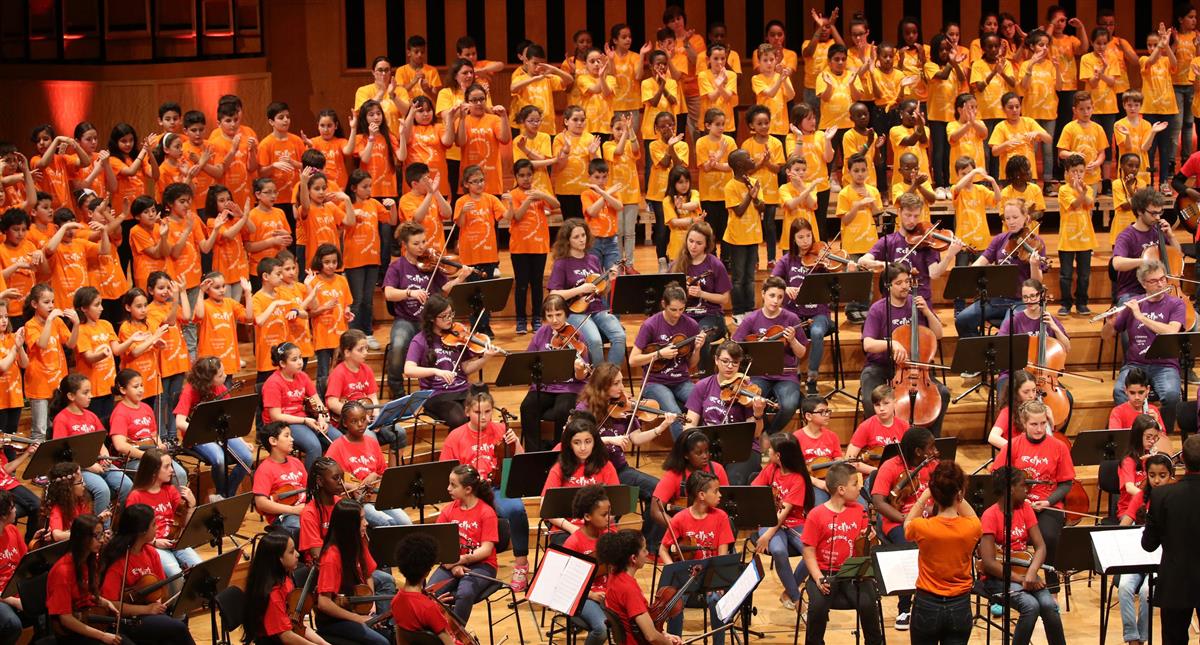
El Sistema Belgium Nord perform at Flagey in 2016 - © Patrick Jacobs
Introduction
ReMuA (Réseau de Musiciens-Intervenants en Ateliers), otherwise known as El Sistema Belgium, provides social music programmes for children living in underprivileged areas in Liège and Brussels.
Its programmes combine both educational (improved academic achievement) and social elements (better social integration) while providing an artistic programme which aims to ensure that participating children will ultimately be able to sing and play an instrument.
With the help of its partner institutes, ReMuA offers children an approach to learning music which aims to provide both true accessibility (through loaning instruments and the provision of some free projects) and artistic excellence.
Its exclusively collective approach owes its success to a form of implementation which is fully adapted to the requirements of its pupils (80% of which come from underprivileged areas), a precisely structured five-year pedagogical programme and strong cultural partnerships (with both professional orchestras and cultural institutions).
ReMuA aims to promote equality of opportunity THROUGH music: children and young people develop a full range of social competencies through musical practice, leading to the heart and the orchestra becoming metaphors for places in which listening, respect and a spirit of cooperation reign.
At the same time, ReMuA promotes equality of opportunity FOR music by providing access to concerts via a dynamic programme of cultural mediation aimed at schools.
Principles
Musical quality
Musical quality is at the heart of ReMuA’s work and is assured by the quality of its resident composers. These original compositions are based on specific themes (such as heritage subjects, Japan, the Amazon, children’s books etc.) and are either orchestral compositions for ReMuA’s Sistema project/partner orchestras or songs for classes and the beginners’ orchestras.
Strong partnerships
To ensure that it gets the support its children require, ReMuA works with a number of partners.
Click here for a list of ReMuA’s cultural partners
The pedagogical approach
At the heart of ReMuA’s musical work lies a passion for pedagogy. The Sistema approaches adopted by ReMuA enable students to learn how to play via fun and creative, collective musical practice. Melodious practice sessions are created through singing, rhythms are learnt via one’s own body and progression occurs naturally as and when required. Vocal and instrumental tuition take place together and are conducted creatively via a series of games and exercises and the instruction of orchestral pieces written for children and communicated according to their individual level of learning. The youngsters are kept motivated by engagement in a series of games and collective creative moments as well as by listening to existing music.
The collective approach adopted by ReMuA provides its pupils with both civil understanding (respect for one another, listening skills, self-esteem and autonomy) and the skills required to boost their own capacity for learning (concentration, perseverance and a desire to learn).
ReMuA’s workshops are organised by musical leaders whose roles are at once artistic, educational and social. As such, each team member comes with both their artistic skills and competencies as well as an educational and social calling.
The musicians are ReMuA’s guarantee for musical excellence. They are professional musicians and play for the children as they would normally. During concerts, they are professional players and teachers, while, in their educational capacities, they carry out a series of functions in the midst of a set group. Furthermore, the musical leaders are also social actors: they form the link between nucleos and families, they manage the loan of instruments and transportation between performance and rehearsal venues and, moreover, they develop a strong bond with the children in their care.
Click here to find out more about ReMuA’s educational team
Cultural mediation
ReMuA provides a cultural mediation programme with a number of options for school pupils:
- A classical music path of discovery featuring interactive concerts adapted to young audiences in partnership with the National Orchestra of Belgium, the Brussels Philharmonic at the Royal Philharmonic Orchestra of Liège.
- A series of discovery workshops at nursery schools, provided with the aim of helping children discover their voices, an instrument, a composer and/or a style of music.
Weekly workshops and courses for children and adults
At locations in Forest (Brussels), Ixelles (Brussels) and Liège, ReMuA provides initiation workshops for children from the age of three, featuring mini-orchestras, choirs, dance and singing for adults.
Courses
During the school holidays, ReMuA offers musical courses for children between the ages of four and 12. These courses are themed and are often combined with a cultural outing. Between music, dance, theatre, instrumental and vocal practice, the courses’ participants go from small to large discoveries, accompanied by the lively sound of music.
Available in seven two-day modules, these courses address those musicians who desire to acquire the tools required to facilitate musicality. Each module revolves around a specific theme and is provided by a team of Belgian, French and British trainers. The basic competencies required to communicate music development in workshops (how to prepare and organise workshops, how to work with rhythm and with voices) are developed in a progressive manner throughout the duration of the course and the courses are recognised by the French Community of Wallonia-Brussels, with participants receiving certificates of attendance on completion of their courses.